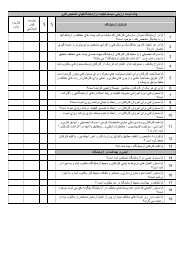new insights into the prevention and treatment of bulimia nervosa
new insights into the prevention and treatment of bulimia nervosa
new insights into the prevention and treatment of bulimia nervosa
Create successful ePaper yourself
Turn your PDF publications into a flip-book with our unique Google optimized e-Paper software.
Interpersonal Problems in People with Bulimia Nervosa <strong>and</strong> <strong>the</strong> Role <strong>of</strong> Interpersonal Psycho<strong>the</strong>rapy<br />
world <strong>and</strong> expectations <strong>of</strong> <strong>treatment</strong>. He/She is also helping <strong>the</strong> patient to make links<br />
between <strong>the</strong>ir difficulties <strong>and</strong> <strong>the</strong>ir interpersonal issues. This can be difficult, particularly as<br />
secrecy is so <strong>of</strong>ten an issue with patients with BN.<br />
5.1.1.2 The role <strong>of</strong> <strong>the</strong> patient<br />
The patient needs to be actively involved in <strong>the</strong>rapy throughout. The more <strong>the</strong>y put <strong>into</strong><br />
<strong>the</strong>rapy <strong>the</strong> more <strong>the</strong>y will get out <strong>of</strong> it. Initially <strong>the</strong> patient should be willing to share <strong>the</strong>ir<br />
difficulties <strong>and</strong> be able to listen to <strong>the</strong> <strong>the</strong>rapist, working with <strong>the</strong>m at making sense <strong>of</strong> <strong>the</strong><br />
current difficulties <strong>and</strong> identifying realistic goals. The patient needs to be able to attend all<br />
planned sessions <strong>and</strong> to focus on any agreed tasks between sessions. Patients are also<br />
expected to track <strong>the</strong>ir symptoms each week <strong>and</strong> to bring to <strong>the</strong> session any relevant<br />
information about <strong>the</strong> agreed focus area. Changes in symptoms can <strong>of</strong>ten be markers <strong>of</strong><br />
interpersonal events, so helping to link <strong>the</strong>se changes to <strong>the</strong> agreed interpersonal focus area<br />
is an important skill for <strong>the</strong> patient to master.<br />
5.1.1.3 Interpersonal focus area<br />
The main task <strong>of</strong> session 4 is in helping <strong>the</strong> patient to choose a focus area to work on during<br />
<strong>the</strong> middle sessions <strong>of</strong> <strong>the</strong>rapy. As in <strong>the</strong> original manual for IPT for depression, <strong>the</strong>re are 4<br />
clear focus areas:<br />
Interpersonal Role Disputes: Difficulties occur when <strong>the</strong> patient has non-reciprocal<br />
expectations from a significant o<strong>the</strong>r. This could be an overt or covert dispute <strong>and</strong> <strong>of</strong>ten<br />
<strong>the</strong>re is a pattern <strong>of</strong> difficult relationships around <strong>the</strong> patient. It is important to focus<br />
on one key relationship that is current <strong>and</strong> where <strong>the</strong> patient feels that change is<br />
possible.<br />
Interpersonal Role Transitions: Difficulties occur when <strong>the</strong> patient has difficulty adjusting<br />
or adapting to changes in <strong>the</strong>ir life. This could be changes at work, in living situation, in<br />
relationships, in financial status or any o<strong>the</strong>r area. What is key is that <strong>the</strong> patient has not<br />
adapted well to <strong>the</strong> changes <strong>and</strong> this is linked to <strong>the</strong>ir illness onset or deterioration.<br />
Interpersonal Deficits: Difficulties occur when patients had problems making or<br />
sustaining relationships with people. There are <strong>of</strong>ten repeated patterns <strong>of</strong> broken or<br />
failed relationships <strong>and</strong> <strong>the</strong> patient may be socially isolated. The patient may be highly<br />
sensitive to <strong>the</strong>ir difficulties so it can be very helpful to use role play in <strong>the</strong> session to<br />
help <strong>the</strong>m practice <strong>new</strong> skills.<br />
Complicated Bereavement: Difficulties can occur when a patient is not able to resolve <strong>the</strong><br />
death <strong>of</strong> a significant figure. This is <strong>of</strong>ten a partner or a family member, but can be <strong>the</strong><br />
death <strong>of</strong> a friend or even a pet. The key feature is that <strong>the</strong> patient is not able to complete<br />
a grieving process <strong>and</strong> this impacts on <strong>the</strong>ir eating disorder <strong>and</strong> mood. The nature <strong>of</strong><br />
<strong>the</strong> attachment with <strong>the</strong> deceased is an important consideration when considering grief<br />
as a focus area.<br />
The task <strong>of</strong> <strong>the</strong> <strong>the</strong>rapist is to find <strong>the</strong> most appropriate focus with <strong>the</strong>ir patient. All <strong>the</strong><br />
information gained so far is assessed by <strong>the</strong> <strong>the</strong>rapist, who by session 4 usually has an idea<br />
<strong>of</strong> what interpersonal issues are central to <strong>the</strong> patient’s problems. IPT does not seek to<br />
underst<strong>and</strong> <strong>the</strong> dynamics behind <strong>the</strong> eating disorder/depression but ra<strong>the</strong>r to help <strong>the</strong><br />
patient make changes to <strong>the</strong>ir life now. The formulation for IPT is <strong>the</strong>refore simple,<br />
pragmatic <strong>and</strong> collaborative. Using <strong>the</strong> patient’s words <strong>and</strong> a summary <strong>of</strong> <strong>the</strong> identified<br />
problem areas that have been highlighted over <strong>the</strong> previous 3 sessions, <strong>the</strong> <strong>the</strong>rapist may<br />
suggest an area to focus on in <strong>the</strong>rapy.<br />
7














![focuspdca.ppt [Compatibility Mode]](https://img.yumpu.com/22859457/1/190x146/focuspdcappt-compatibility-mode.jpg?quality=85)


